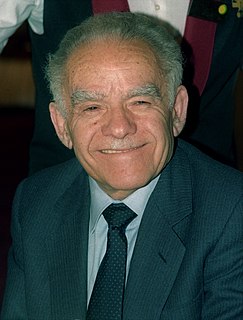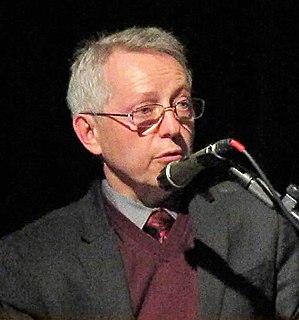A Quote by Yitzhak Shamir
A man who goes forth to take the life of another whom he does not know must believe only one thing: that by his act he will change the course of history.
Related Quotes
Man is the only animal that deals in that atrocity of atrocities War. He is the only one that gathers his brethren about him and goes forth in cold blood and calm pulse to exterminate his kind. He is the only animal that for sordid wages will march out... and help to slaughter strangers of his own species who have done him no harm and with whom he has no quarrel.... And in the intervals between campaigns he washes the blood off his hands and works for the universal brotherhood of man with his mouth.
Without constraint, without any form of mental compulsion, the act of belief becomes the freest possible projection of what resides in our hearts. Like the poet's image of a church bell that reveals its latent music only when struck, or a dragonfly that flames forth its beauty only in flight, so does the content of a human heart lie buried until action calls it forth. The greatest act of self-revelation occurs when we choose what we will believe, in that space of freedom that exists between knowing that a thing is and knowing that a thing is not.
I do not recall another period when ‘faith’ was as popular as it is today. ‘If only we believe hard enough we'll make it somehow.’ So goes the popular chant. What you believe is not important. Only believe... What is overlooked in all this is that faith is good only when it engages truth; when it is made to rest upon falsehood it can and often does lead to eternal tragedy. For it is not enough that we believe; we must believe the right thing about the right One.
It is not good enough to know why we are oppressed and by whom. We must join the struggle for what is right and just. Jesus does not promise that it will be an easy way to live life and His own life certainly points in a hard direction; but it does promise that we will be "satisfied" (not stuffed; but satisfied). He promises that by giving life we will find life - full, meaningful life as God meant it.
What history teaches us is that man does not change arbitrarily; he does not transform himself at will on hearing the voices of inspired prophets. The reason is that all change, in colliding with the inherited institutions of the past, is inevitably hard and laborious; consequently it only takes place in response to the demands of necessity. For change to be brought about it is not enough that it should be seen as desirable; it must be the product of changes within the whole network of diverse casual relationships which then determine the situation of man.
Every man should write a brief history of his life: his parentage, his birth, his religion, when he was baptized and by whom, when ordained, what to, and by whom-give a brief sketch of all his missions and of all his official acts and the dealings of God with him. Then if he were to die and the historians wished to publish his history, they would have something to go by.
A thorough-paced knave will rarely quarrel with one whom he can cheat: his revenge is plunder; therefore he is usually the most forgiving of beings, upon the principle that if he come to an open rupture, he must defend himself; and this does not suit a man whose vocation it is to keep his hands in the pocket of another.
Man is the only animal who does not feel at home in nature, who can feel evicted from paradise, the only animal for whom his own existence is a problem that he has to solve and from which he cannot escape. He cannot go back to the prehuman state of harmony with nature, and he does not know where he will arrive if he goes forward. Man's existential contradiction results in a state of constant disequilibrium. This disequilibrium distinguishes him from the animal, which lives, as it were, in harmony with nature.
In the ardor of his enthusiasm, a youth set forth in quest of a man of whom he might take counsel as to his future, but after long search and many disappointments, he came near relinquishing the pursuit as hopeless, when suddenly it occurred to him that one must first be a man to find a man, and profiting by this suggestion, he set himself to the work of becoming himself the man he had been seeking so long and fruitlessly.
A man must know his destiny… if he does not recognize it, then he is lost. By this I mean, once, twice, or at the very most, three times, fate will reach out and tap a man on the shoulder… if he has the imagination, he will turn around and fate will point out to him what fork in the road he should take, if he has the guts, he will take it.
The man who knows God but does not know his own misery, becomes proud. The man who knows his own misery but does not know God, ends in despair...the knowledge of Jesus Christ constitutes the middle course because in him we find both God and our own misery. Jesus Christ is therefore a God whom we approach without pride, and before whom we humble ourselves without despair.
Ideas are powerful things, requiring not a studious contemplation but an action, even if it is only an inner action. Their acquisition obligates each man in some way to change his life, even if it is only his inner life. They demand to be stood for. They dictate where a man must concentrate his vision. They determine his moral and intellectual priorities. They provide him with allies and make him enemies. In short, ideas impose an interest in their ultimate fate which goes far beyond the realm of the merely reasonable.











































